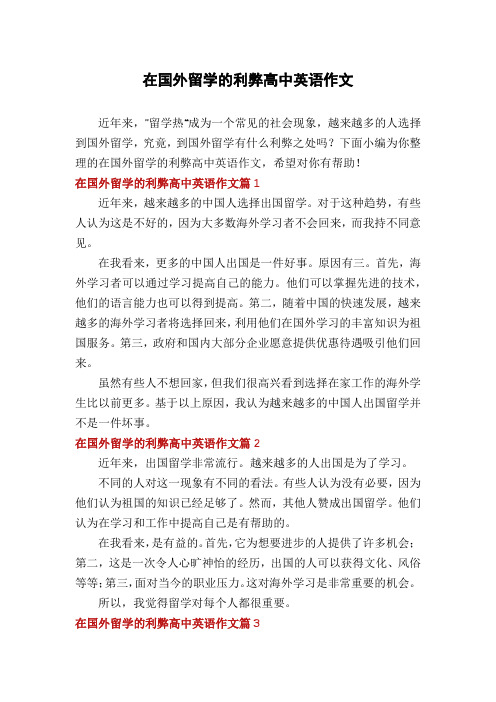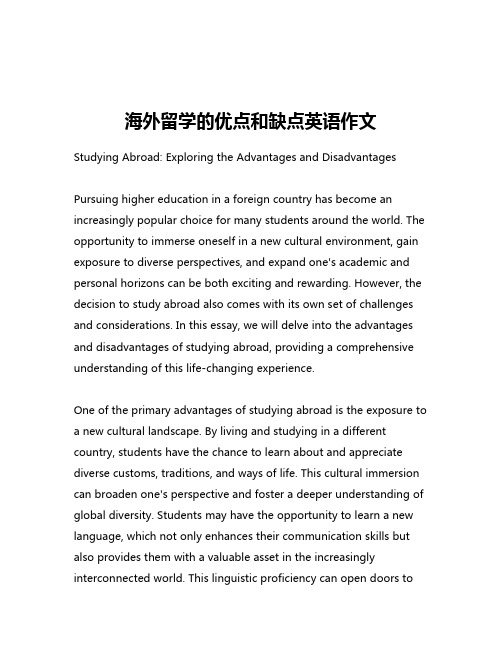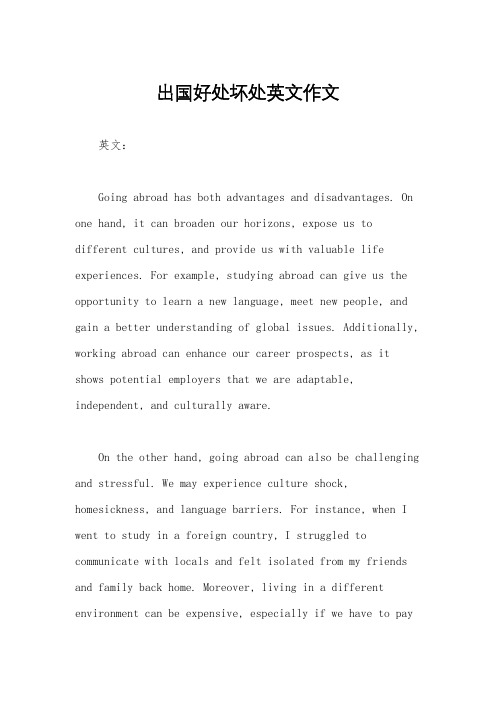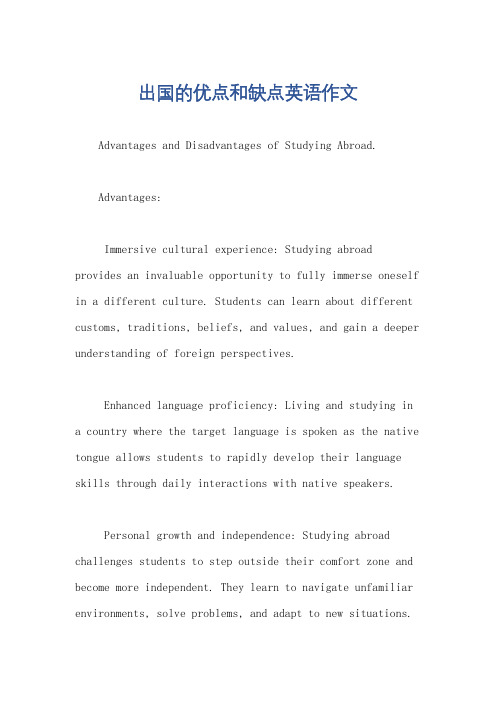英语专四系列:作文之范文赏析--出国留学的利与弊
海外留学优点和缺点英语作文

海外留学优点和缺点英语作文Studying Abroad: Weighing the Pros and ConsPursuing higher education overseas has become an increasingly popular choice for students around the world. The opportunity to immerse oneself in a different culture, expand one's academic and personal horizons, and gain a global perspective can be truly transformative. However, the decision to study abroad also comes with its own set of challenges and considerations. In this essay, we will explore the advantages and disadvantages of studying abroad, allowing us to make a more informed decision about this life-changing experience.One of the primary advantages of studying abroad is the exposure to a new cultural environment. By living and studying in a foreign country, students have the chance to broaden their understanding of diverse customs, traditions, and ways of life. This cultural immersion can lead to a greater appreciation for different perspectives and a more nuanced worldview. Additionally, the experience of navigating a foreign educational system and social structures can foster adaptability, problem-solving skills, and independence – all valuable assets in today's increasingly globalized world.Moreover, studying abroad often provides students with the opportunity to learn or improve a second language. Immersion in the target language, whether it be English, Mandarin, Spanish, or any other, can lead to significant advancements in language proficiency. This linguistic proficiency not only enhances academic and professional prospects but also enables deeper cross-cultural communication and understanding. The ability to converse fluently in multiple languages is a highly sought-after skill in the global job market, making study abroad graduates more competitive and attractive to potential employers.Another significant advantage of studying abroad is the opportunity to expand one's academic and personal horizons. By exposing themselves to different teaching methodologies, course offerings, and research opportunities, students can broaden their intellectual and creative boundaries. This exposure can lead to the discovery of new academic interests, the development of specialized skills, and the cultivation of a global mindset. Furthermore, the experience of navigating a foreign educational system can foster critical thinking, adaptability, and a deeper appreciation for diverse approaches to learning and problem-solving.In addition to the academic benefits, studying abroad also offers personal growth and development. Living independently in a newenvironment, away from the comfort of one's home country, can encourage self-discovery, self-reliance, and the development of life skills. Students are often challenged to step out of their comfort zones, make new friends, and navigate unfamiliar social and practical situations. This can result in increased self-confidence, resilience, and the ability to adapt to changing circumstances – all valuable assets for future personal and professional endeavors.However, the decision to study abroad also comes with its own set of challenges and potential drawbacks. One of the primary concerns is the financial burden associated with studying abroad. Tuition fees, living expenses, and travel costs can be significantly higher than studying in one's home country, making it a financially demanding undertaking. This can be especially challenging for students from lower-income backgrounds, limiting their access to international educational opportunities and potentially leading to increased student debt.Another potential drawback of studying abroad is the feeling of homesickness and cultural disconnect. Adjusting to a new environment, language, and social norms can be a daunting and emotionally taxing experience. Students may struggle with feelingsof isolation, loneliness, and a sense of not belonging, which can negatively impact their academic performance and overall well-being. Additionally, the physical distance from family and friends can beemotionally challenging, particularly during significant life events or personal crises.Furthermore, the academic challenges of studying abroad should not be overlooked. Navigating a different educational system, adhering to unfamiliar academic requirements, and adjusting to new teaching styles can be overwhelming for some students. This can lead to difficulties in academic performance, potentially jeopardizing their educational goals and future prospects.Finally, the logistical and practical challenges of studying abroad can also be a significant hurdle. Securing housing, transportation, and other essential services in a foreign country can be a complex and time-consuming process, often requiring extensive research and planning. Additionally, the administrative procedures involved in obtaining visas, health insurance, and other necessary documentation can be daunting and stressful.In conclusion, the decision to study abroad is a complex one that requires careful consideration of both the advantages and disadvantages. While the opportunity to immerse oneself in a new culture, expand one's academic and personal horizons, and develop valuable skills is undoubtedly enticing, the financial, emotional, and practical challenges cannot be overlooked. Ultimately, the decision to study abroad should be based on a thorough evaluation of one'spersonal, academic, and financial goals, as well as a realistic assessment of one's ability to navigate the unique challenges that come with this life-changing experience.。
出国留学的利弊分析高中英语作文_英语作文

出国留学的利弊分析高中英语作文.写作作为英语教学的一个重点与难点一直为师生所关注。
但在实际的英语学习过程中,一些学生将更多的时间投入到见效较快的词汇、英语阅读等部分,而忽略了英语写作问题。
近年来,越来越多人选择出国留学。
那么,出国留学到底是好还是不好呢?下面是橙子为你整理的几篇关于出国留学的利弊分析高中英语作文,希望你能喜欢!出国留学的利弊分析高中英语作文篇1Recent years, more and more Chinese people have chosen to study abroad. To this tendency, some people think it is not good, as most of the overseas learners do not come back, whereas I hold a different opinion.In my opinion, it is a good thing that more Chinese people go abroad. There are three reasons. First, the overseas learners can improve their ability through the study. They can grasp advanced technologies and their language ability can be improved as well. Second, with the rapid development of China, more and more overseas learners will choose come back, using their abundant knowledge studied abroad to serve for the motherland. The third, the government and most domestic enterprises are willing to provide favorable treatments to 1 / 3attract them to come back.Although some do not want to come home, we are glad to see that there are more overseas learners chosen to work at home than before. For the above reasons, I think it is not a bad thing for more and more Chinese study abroad出国留学的利弊分析高中英语作文篇2Nowadays, many people like to study abroad. Studying abroad is often considered as a great opportunity which will lead to bright future in one's ride of passage. Not only can we learn different cultures and knowledge from foreign countries, studying abroad can also enrich our lives. But every coin has two sides. Likewise, different people have different minds. Disadvantages of studying abroad may affect one's life culturally and economically. Studying abroad can cost students a great deal of living expenses. Some Chinese students are so academically successful that they receive scholarships in their studies. However, most peers who study abroad do not receive scholarships. Furthermore, they have to deal with many unexpected hardships by living away from their parents and homeland. For example, medical insurance, daily foods, clothes, rents and transportation can generate a large amount of living 2 / 3expenses. Often time, they need to heavily depend on their parents' overseas monthly payments.出国留学的利弊分析高中英语作文篇3Recent years, more and more Chinese people have chosen to study abroad. To this tendency, some people think it is not good, as most of the overseas learners do not come back, whereas I hold a different opinion.In my opinion, it is a good thing that more Chinese people go abroad. There are three reasons. First, the overseas learners can improve their ability through the study. They can grasp advanced technologies and their language ability can be improved as well. Second, with the rapid development of China, more and more overseas learners will choose come back, using their abundant knowledge studied abroad to serve for the motherland. The third, the government and most domestic enterprises are willing to provide favorable treatments to attract them to come back.For the above reasons, I think it is not a bad thing for more and more Chinese study abroad.3 / 3。
在国外留学的利弊高中英语作文

在国外留学的利弊高中英语作文近年来,”留学热“成为一个常见的社会现象,越来越多的人选择到国外留学,究竟,到国外留学有什么利弊之处吗?下面小编为你整理的在国外留学的利弊高中英语作文,希望对你有帮助!在国外留学的利弊高中英语作文篇1近年来,越来越多的中国人选择出国留学。
对于这种趋势,有些人认为这是不好的,因为大多数海外学习者不会回来,而我持不同意见。
在我看来,更多的中国人出国是一件好事。
原因有三。
首先,海外学习者可以通过学习提高自己的能力。
他们可以掌握先进的技术,他们的语言能力也可以得到提高。
第二,随着中国的快速发展,越来越多的海外学习者将选择回来,利用他们在国外学习的丰富知识为祖国服务。
第三,政府和国内大部分企业愿意提供优惠待遇吸引他们回来。
虽然有些人不想回家,但我们很高兴看到选择在家工作的海外学生比以前更多。
基于以上原因,我认为越来越多的中国人出国留学并不是一件坏事。
在国外留学的利弊高中英语作文篇2近年来,出国留学非常流行。
越来越多的人出国是为了学习。
不同的人对这一现象有不同的看法。
有些人认为没有必要,因为他们认为祖国的知识已经足够了。
然而,其他人赞成出国留学。
他们认为在学习和工作中提高自己是有帮助的。
在我看来,是有益的。
首先,它为想要进步的人提供了许多机会;第二,这是一次令人心旷神怡的经历,出国的人可以获得文化、风俗等等;第三,面对当今的职业压力。
这对海外学习是非常重要的机会。
所以,我觉得留学对每个人都很重要。
在国外留学的利弊高中英语作文篇3在国外上学有很多好处。
首先,通过从外部看我们自己的国家,我们可以最好地看到我们国家的优点,从而开阔我们的视野和心胸。
其次,在国外学习的同时,我们可以广泛旅行,参观著名的景点,与当地人交朋友。
第三,我们可以在日常生活中使用外语,这样我们的第二语言能力可以很快提高。
但是在国外上大学最重要的是了解最新的科学技术知识,并利用一流的设施。
尽管有这些优势,出国深造真的很值得。
留学海外利与弊英语四级作文带翻译

留学海外利与弊英语四级作文带翻译留学海外利与弊英语四级作文带翻译Attending school abroad has many advantages. In the first place, by looking at our own country from the outside, we can best see the strong points of our nation, and therefore widen our vision and broaden our minds. Secondly, while studying in a foreign country, we can travel widely, visiting famous scenic spots and making friends with the local people. Thirdly, we can use the foreign language in our daily life so that our ability in the second language may be improved quickly. But the most important thing in attending a foreign university is to get acquainted with the latest knowledge in science and technology and make use of the first-rate facilities available. For all these advantages, it is really worthwhile to go abroad for further studies.店铺有很多好处。
在第一个地方,看我们的祖国,我们可以看到我们国家的长处,从而开阔我们的视野和思路。
海外留学的优点和缺点英语作文

海外留学的优点和缺点英语作文Studying Abroad: Exploring the Advantages and DisadvantagesPursuing higher education in a foreign country has become an increasingly popular choice for many students around the world. The opportunity to immerse oneself in a new cultural environment, gain exposure to diverse perspectives, and expand one's academic and personal horizons can be both exciting and rewarding. However, the decision to study abroad also comes with its own set of challenges and considerations. In this essay, we will delve into the advantages and disadvantages of studying abroad, providing a comprehensive understanding of this life-changing experience.One of the primary advantages of studying abroad is the exposure to a new cultural landscape. By living and studying in a different country, students have the chance to learn about and appreciate diverse customs, traditions, and ways of life. This cultural immersion can broaden one's perspective and foster a deeper understanding of global diversity. Students may have the opportunity to learn a new language, which not only enhances their communication skills but also provides them with a valuable asset in the increasingly interconnected world. This linguistic proficiency can open doors tofuture career opportunities and personal growth.Furthermore, studying abroad often presents students with the chance to gain a more independent and self-reliant mindset. Living away from the comfort of their home environment requires students to navigate unfamiliar surroundings, manage their own finances, and make decisions independently. This level of autonomy can contribute to the development of essential life skills, such as problem-solving, adaptability, and resilience. These qualities are highly valued by employers and can give students a competitive edge in the job market upon their return.Another significant advantage of studying abroad is the opportunity to expand one's academic and professional horizons. By studying in a foreign institution, students may have access to specialized programs, cutting-edge research facilities, or unique learning opportunities that may not be available in their home countries. This exposure to diverse educational systems and approaches can broaden their academic perspectives and provide them with a more well-rounded education. Additionally, studying abroad can facilitate the establishment of international networks and collaborations, which can be beneficial for future career prospects and research endeavors.However, it is important to acknowledge the potential challengesand disadvantages associated with studying abroad. One of the primary concerns is the financial burden. Studying in a foreign country often comes with higher tuition fees, living expenses, and travel costs, which can be a significant financial strain on students and their families. This financial commitment can be a deterrent for some students, particularly those from underprivileged backgrounds, and may limit the accessibility of overseas education.Another potential disadvantage is the sense of homesickness and cultural shock that students may experience. Adapting to a new environment, language, and social norms can be a daunting and stressful process, especially for those who are far from their support systems. This adjustment period can take a toll on a student's mental health and well-being, potentially affecting their academic performance and overall quality of life.Additionally, studying abroad may present challenges in terms of credit transfer and academic recognition. Navigating the differences in educational systems, grading scales, and degree structures can be complex and may result in difficulties in transferring credits or having one's qualifications recognized upon return to their home country. This can create additional hurdles for students and may prolong the duration of their studies.Furthermore, the experience of studying abroad can lead to thedevelopment of a strong attachment to the host country, which may make it challenging for students to return to their home countries after graduation. This can result in a brain drain, where talented individuals choose to remain in the host country rather than contributing to the development of their home countries.In conclusion, studying abroad is a multifaceted experience that offers both advantages and disadvantages. While the cultural immersion, academic enrichment, and personal growth opportunities can be invaluable, the financial burden, homesickness, and academic recognition challenges must also be carefully considered. Ultimately, the decision to study abroad should be based on a thorough evaluation of one's personal goals, financial resources, and willingness to embrace the unique challenges and rewards of this life-changing experience. By weighing the pros and cons, students can make an informed decision that aligns with their educational and personal aspirations.。
出国留学利弊英语作文

出国留学利弊英语作文The Pros and Cons of Studying AbroadWith the development of globalization, studying abroad has become an attractive option for many young people. However, this journey is not without its pros and cons. Let’s explore both sides of this coin.Pros of Studying Abroad:1、Language immersion: The opportunity to fully immerse oneself in a new language environment is an invaluable experience. It provides the opportunity to not only learn the language, but also to understand the culture and people.2、Education: Foreign education systems are often considered to be more advanced than their domestic counterparts. The exposure to different teaching methods and the opportunity to learn from renowned educators can provide valuable skills and knowledge.3、Career opportunities: Studying abroad can provide unique networking opportunities and the possibility of staying on to work in that country after graduation. It also adds aninternational dimension to one’s resume, making them more attractive to future employers.4、Personal growth: Living in a foreign country provides an opportunity for personal growth. It challenges one’s perspective on life and can lead to a better understanding of oneself.Cons of Studying Abroad:1、Cost: The cost of studying abroad can be prohibitive, with expenses for tuition, living expenses, and often travel expenses. Add to this, the often complex and lengthy application process can also be expensive.2、Culture shock:适应新的文化环境,并不总是容易的。
出国好处坏处英文作文

出国好处坏处英文作文英文:Going abroad has both advantages and disadvantages. On one hand, it can broaden our horizons, expose us to different cultures, and provide us with valuable life experiences. For example, studying abroad can give us the opportunity to learn a new language, meet new people, and gain a better understanding of global issues. Additionally, working abroad can enhance our career prospects, as it shows potential employers that we are adaptable, independent, and culturally aware.On the other hand, going abroad can also be challenging and stressful. We may experience culture shock, homesickness, and language barriers. For instance, when I went to study in a foreign country, I struggled to communicate with locals and felt isolated from my friends and family back home. Moreover, living in a different environment can be expensive, especially if we have to payfor accommodation, food, and travel.中文:出国既有优点也有缺点。
出国的优点和缺点英语作文

出国的优点和缺点英语作文Advantages and Disadvantages of Studying Abroad.Advantages:Immersive cultural experience: Studying abroad provides an invaluable opportunity to fully immerse oneself in a different culture. Students can learn about different customs, traditions, beliefs, and values, and gain a deeper understanding of foreign perspectives.Enhanced language proficiency: Living and studying in a country where the target language is spoken as the native tongue allows students to rapidly develop their language skills through daily interactions with native speakers.Personal growth and independence: Studying abroad challenges students to step outside their comfort zone and become more independent. They learn to navigate unfamiliar environments, solve problems, and adapt to new situations.Increased global awareness: Spending time in a foreign country broadens students' horizons and helps them develop a more global perspective. They learn about different political systems, economic models, and social structures, and gain a better understanding of the world around them.Improved career prospects: Studying abroad demonstrates to potential employers a student's adaptability, cultural sensitivity, and international experience. It can be a valuable asset in today's increasingly interconnected global workforce.Disadvantages:High cost: Studying abroad can be a significant financial burden. Students must consider tuition, living expenses, travel costs, and other associated expenses.Homesickness and culture shock: Leaving familiar surroundings and being immersed in a new culture can sometimes lead to homesickness or culture shock. Studentsmay feel overwhelmed, disoriented, or isolated at times.Academic adjustments: The academic systems and educational standards of different countries can vary significantly. Students may need to make adjustments to their learning style or coursework to succeed in their host institution.Language barriers: While studying abroad can greatly enhance language proficiency, students may initially encounter language barriers that can be frustrating or challenging.Limited time: Study abroad programs typically have a fixed duration, which may restrict students' ability to fully explore their host country and culture or pursue other interests.中文回答:出国留学的优点:沉浸式的文化体验,出国留学提供了全面融入不同文化之中宝贵的机遇。
- 1、下载文档前请自行甄别文档内容的完整性,平台不提供额外的编辑、内容补充、找答案等附加服务。
- 2、"仅部分预览"的文档,不可在线预览部分如存在完整性等问题,可反馈申请退款(可完整预览的文档不适用该条件!)。
- 3、如文档侵犯您的权益,请联系客服反馈,我们会尽快为您处理(人工客服工作时间:9:00-18:30)。
英语专四系列:作文之范文赏析--出国留学的利与弊
英语专四系列:作文之范文赏析--出国留学的利与弊
题目:Studying Abroad: Hardships and Rewards
写作要求
Nowadays more and more students choose to go abroad after they graduate from colleges and universities. They say that they benefi t a lot from it, though som e people argue that there are many hardships and diffi culties. What’s your opinion about it?
Write on Answer Sheet Two a composition of about 200 words on the following topic:
Studying Abroad: Hardships and Rewards
You are to write in three parts.
In the fi rst part, state specifi cally what your idea is.
In the second part, provide reasons to support your opinion OR describe your idea.
In the last part, bring what you have written to a natural conclusion or a summary.
Marks will be awarded for content, organization, grammar and appropriateness. Failure to
follow the instructions may result in a loss of marks.
审题思路
本题是一个观点选择型的题目,就目前大学生在毕业后选择留学的利弊孰大孰小进行分析。
题目可以从以下几个方面入手:
思路1:利大于弊
虽然有困难,但整体上利大于弊,利体现在:1. 教学软件硬件优异;2. 有利于将来就业等。
思路2 :弊大于利
虽然有好处,但整体上弊大于利,弊体现在:1. 费用昂贵;
2. 文化差异,难以融入其中等。
思路3 :应具体问题具体分析,因人而异
留学有益,体现参考思路1;
留学也有弊端,体现参考思路2 ;
是否选择留学,应根据个人情况而定。
Studying Abroad: Hardships and Rewards
There is no denying the fact that studying abroad is a hotly debated2 topic today. As far as I’m,concerned, I believe hardships and rewards coexist and people have to consider it from all sides.
引言部分:作者先提出留学是个热门话题,然后说明留学有利有弊应全面综合来考虑。
这表明下文将既讲利又讲弊。
Obviously, studying abroad has a number of rewards . In the first place, a student can have access to advanced science and technology as well as desirable working conditions which
mightnot be available at home. In the second place, he can be exposed to entirely new ideas and trends. Last but not least, by living and studying in a foreign country, one can improve his foreign language much faster than at home.
Nevertheless, as every coin has two sides, studying abroad also confronts one with a series of hardships. For one thing, learning a foreign language is far from an easy thing at the beginning for most people. For another, a completely new environment with different customs and habits may also be a barrier to overseas students, especially to the young. An added difficulty lies with finance: it can cost a lot to study abroad.
主体部分:作者先说有几个显而易见的益处是列举观点时常用的句式。
然后用“In the first place, ... In the second place, ... Last but not least”。
nevertheless进行转折,说明留学会让人遇到很多困难。
这时列举所用的句式换为“for one thing ... for another...”使文章更富有变化。
Therefore, studying abroad should be viewed as a two-edged sword, which presents us with10 both benefi ts and troubles. The best policy11, as I see it, is to take into consideration his financial
conditions and his ability to adapt to new surrounding. Personally, I’d choose to go abroad and study if I find it necessary.
总结部分:作者概述上面所列利弊,用“a two-edged sword”来概括再恰当不过,并提出选择出国留学的标准应该是“take into consideration his financial conditions and his ability to adapt to new surrounding”。
亮点回放
1. there is no denying that:“无可否认”;还可以用undoubtedly ,without doubt等更为简洁的表达方式。
2. hotly debated: “被激烈讨论的”;相当于“heavily/frequently discussed”,但比之要g更地道些。
3. rewards: “奖赏、报酬、报答”;此处表示“回报”,近义词为“returns”。
4. have access to: “能获得”,access的形容词accessible也经常使用在be accessible to的词组中,注意与之区别。
5.desirable:“令人满意的,称心如意的”,另外它的反义词undesirable表示“不尽如人意的”。
6. be exposed to: “暴露在……之下”,此处还可以用“be faced with ,be confronted with”等。
7. confront sb. with sth.: “使某人遭遇到(某事)”,此处注意与be exposed to的区别,前者不以人为主语,用主动语态;后者以人为主语,用被动语态。
8. far from: “远离”,此处表示“远非”,相当于never ,但语气委婉些。
9. barrier:“障碍”,近义词还有“obstacle ,block ,hardship ,setback”等。
10. present sb. with sth.: “给某人带来某物”,也可以用“provide sb. with sth.”,但present 显得更正式些。
11. policy : “政策、方针、保险单”,此处“the best policy ”
表示“最好的办法”,用法地道。
